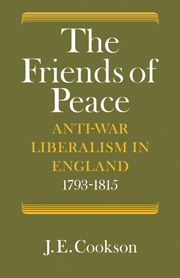Book contents
10 - CHRISTIAN PETITIONS
Published online by Cambridge University Press: 07 October 2011
Summary
On 27 August 1812 the ‘Friends of Peace’ of Derby, Nottinghamshire and Leicester met at the Baptist Chapel, Loughborough. Little is known of who was present and what passed. The resolutions in favour of a ‘general’ peace, which were later printed and widely circulated, carried the name of William Strutt, the Derby manufacturer, as chairman. Major Cartwright, the parliamentary reformer, was a speaker, though his speech is unrecorded as is virtually the rest of the proceedings. Indeed, the Major's brief account of the meeting in a letter to his wife contains the only estimate of attendance–‘about six hundred persons’. This lack of information has not helped historians to perceive the connection between the Lough-borough meeting and the peace petitions which found their way to Westminster early in 1813. These petitions were not isolated protests against the war; they were the product of yet another agitation largely organised by liberals and widely felt but concentrated in the manufacturing districts. What happened at Loughborough encouraged a relatively small number of men to return home and raise the issue of war and peace in their neighbourhoods and congregations and further afield. The result was the most ambitious attempt to organise anti-war opinion during the whole war period, and geographically the most extensive protest since the largely Whiginspired effort of 1797.
Even so, the meetings for peace were but one swell among many which caused creaking of the timbers of conservatism and authority in 1812–13.
- Type
- Chapter
- Information
- The Friends of PeaceAnti-War Liberalism in England 1793–1815, pp. 238 - 254Publisher: Cambridge University PressPrint publication year: 1982



